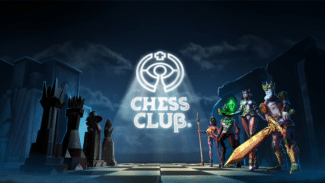Odders delivers almost all you could ask for in VR chess, though there are some loose ends to tie up. More in our Chess Club review.
Where do you start when reviewing chess? Well, don’t review chess, obviously; it’s chess. You know if you like chess or if you don’t like chess. So, I guess, look at the features, the presentation and the overall substance of the given take. And, to be fair, in these areas Chess Club performs very well.
Chess Club is a bit of an odd one for Odders (pun not intended). Its last game, OhShape, was about as active as VR gaming gets and Chess Club is, well, the polar opposite. But I understand the logic. I suspect the team spotted a gap in the increasingly lucrative Quest market – we’ve already got great table tennis, mini-golf and other games that present very few barriers to immersion. You don’t really ‘need’ more than one type of these games if the first ones get it right, so why not plug that gap yourself?
And Chess Club measures up to the task with ease; varying levels of AI opponents for those that want to face the cold faultlessness of a machine and multiplayer support for the full experience with friends. It even recommends human opponents for you based on the skill you’ve displayed in past matches and tracks moves during games should you want to review where things started to go wrong.
If you want the strictest, most down-to-earth chess experience, that’s here. You can play with traditional pieces or — my personal preference — travel to Stonehenge and play with fantasy-themed animated pieces. This is a brilliant little miracle, watching pawns confidently stride across spaces and knock each other out with a hammer in combat, or marveling at a Queen wiping through the infantry with little effort. The animations are really well done as is the overall visual design. In fact, it’s a shame that there aren’t more of these themes to enjoy at launch, or unlock through a progression system, but Odders says these will arrive in future updates.
The optional hand-tracking support also works really well for the most part, and this is one of the few experiences in which I actually prefer to set the controllers aside.
Odders hasn’t really put a foot wrong, then, so much as there is stuff still left to add. The lack of a tutorial is notable, and it could use a challenge mode that pits you in specific situations to both lend a little variety and help train you to be a better player. I’d also like to see the game come to more platforms – there really isn’t much reason that this shouldn’t have cross-play support with flatscreens and other headsets to expand the list of potential opponents.
Chess Club Review – Final Impressions
Chess Club does pretty much all it needs to do to solidify a position as the worthy chess game Quest has been missing. There are online and AI options and great visual polish whether you want the classic experience or something a little more novel, plus great hand-tracking support to help make the experience as accessible as possible. It could do with more in terms of modes and themes but Odders is likely to deliver on that front over time and, save for more versions of the game with cross-play support, there’s not really too much more you could ask of it. If you’re after an Oculus Quest chess obsession, look no further.
 For more on how we arrived at this score, read our review guidelines. What did you make of our Chess club review? Let us know in the comments below!
For more on how we arrived at this score, read our review guidelines. What did you make of our Chess club review? Let us know in the comments below!






